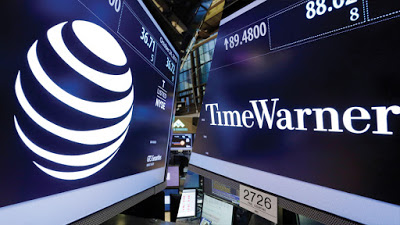
On June 2, 2018. It was announced that the federal court has approved of the 85-billion-dollar merger and acquisition deal between America’s telecommunications giant ‘AT&T” and “TIME WARNER” a formidable media behemoth based in the USA. How big of a deal this is cannot be overstated. Already, AT&T boast of subsidiaries such as DirectTV, Appnexus, Leapwireless, Pacificbell, Southwesternbell and so many more, TIME WARNER on the other hand as media kings have CNN, Cartoon Network, Adult Swim, HBO, TNT, Hulu, Warner Bros, New Line cinema amongst a myriad of other companies in just their warner media section.
It is important to note that the two companies are not competitors in the service delivery sense, with AT&T being a wireless network provider/telecoms company and Time-Warner, primarily a media company, such a merger, although, vertical in nature still leaves a lot to worry about. It is no wonder the Department of Justice (DOJ) challenged the merger in the first place. According to Forbes, AT&T announced in 2016, that it will acquire Time Warner in a stock and cash deal valued at $85.4 billion, integrating its vast distribution network, which spans wireless and broadband services and pay TV, with Time Warner’s media asset. Now, AT&T has been increasingly interested in the media and content businesses as growth in its core wireless business has slowed, while its landline businesses are in steady decline. In 2015, the firm closed a $49 billion deal to buy DirecTV in a move that made it America’s largest pay TV operator. With the deal came over 25 million customers and a swath of highly valuable content agreements. The carrier has been focusing on widening its distribution footprint, with plans later to launch its own streaming TV service targeting cord cutters, “DirecTV Now”. By acquiring Time Warner, AT&T would own high-quality original content, besides gaining some bargaining leverage in acquiring content from other companies for distribution. Rising content costs are becoming an issue for pay TV players, as customers opt for smaller TV bundles or switch to web-based streaming services altogether. Moreover, the firm expects $1 billion in annual run rate cost synergies within three years of the deal closing, driven primarily by corporate and procurement expenditures.
The DOJ argued that the merger would run afoul of the anti-trust law or competition law. However, the court was not satisfied with the arguments of the DOJ in stating that the approval would create some kind of monopoly or pose a threat to the free market economy, especially in light of the fact that the same is a vertical merger and not a horizontal one, that is two firms producing different products and services but coming together for strategic alliances.
Nevertheless, I find reason with the DOJ in their counter, for one, in the absence of any information as to whether an MOU was reached to prevent Warner Media from unethically favoring AT&T in content usage, the cord cutting act by AT&T by expanding into online streaming services and basically owning considerable media content on pay TV, all in the name of providing better and more cost effective products, is definitely going to hurt other ‘not so big companies’ who can only offer TV subscription services, we must bear in mind that AT&T is an already large and powerful company, hence, having acquired media content rights from TIME-WARNER by virtue of this merger, media contents which a sizeable amount of Americans and the world in general are inadvertently glued to, we are looking at the most subtle media take over yet.
In Nigeria, the Securities and Exchange Commission (SEC) is a commission established by the National Assembly through the promulgated 1nvestment and Securities Act 2007, it is charged with the roles of regulating the capital market and granting approval to company restructuring modes, such merger & acquisitions, takeover bids and so on. It must be established that if the “AT&T deal” was held in Nigeria, legally speaking, it would have flown freely and without any challenge from any DOJ. The reason being that, although the Telecommunications sector is a reasonably regulated sector in Nigeria, there appears to be little or no attention to anti-trust issues. The SEC also does not have the yardstick for determining, truly, as to whether a transaction would substantially restrain competition or create a monopoly.
Thankfully, The Federal Competition and Consumer Protection Bill was passed, at the tail end of 2017, by the National Assembly. Although, awaiting consent from the President, this legislation attempts to solve the grey areas surrounding company restructuring and consumer policy. According to the Guardian newspaper, “When it receives the President’s assent and becomes law, it will repeal the Consumer Protection Act and transfer all the staff and assets of the Consumer Protection Council to the newly created Federal Competition and Consumer Protection Commission”. “To avoid confusion with the likes of the National Communications Commission, the National Electrical Regulatory Commission, the Security & Exchanges Commission (SEC) or the Corporate Affairs Commission (CAC) in matters affecting competition, the Federal Competition Commission is given supremacy over the existing government agencies. However, it may designate certain sectors as “regulated industries” and cede regulation to their supervising government agencies”.
In all, it is important for the regulatory agency concerned with anti-trust/ competition laws to look beyond the structure of mergers and standardize the economic power that would be result from such marriage. The AT&T merger is no doubt a huge win for the AT&T company, whether or not we like it, the world would be paying AT&T from now on for Television, thus, making it too powerful for competition, a tragedy in a free market economy.

Eseoghene Palmer Esq is an associate with Adedunmade Onibokun & Co. He has cultivated interest in Corporate Law, Property, Intellectual Property, Sports, Entertainment law and Mediation
Photo Credit – www.variety.com
